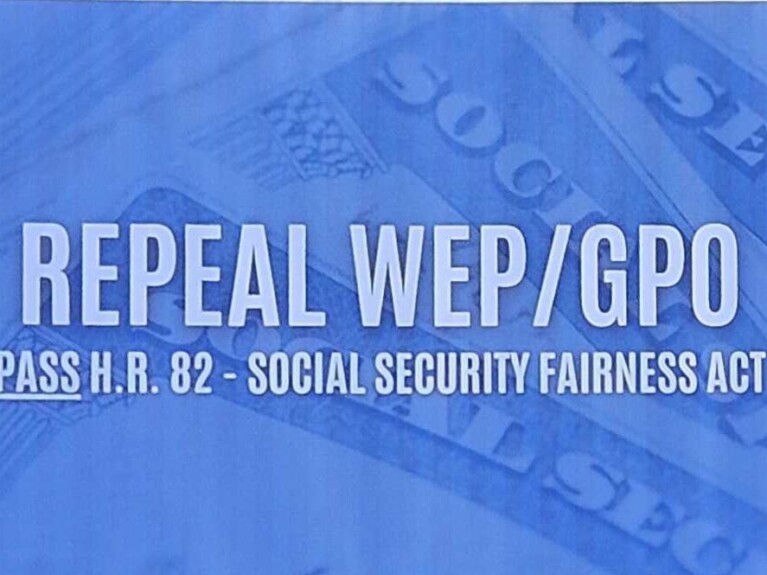Summary of H.R. 711, to Reform the Windfall Elimination Provision (WEP)
July 14, 2016 Update
On July 13, the House Committee on Ways and Means pulled its consideration of a Windfall Elimination Provision (WEP) reform bill, H.R. 711, amid concerns on a variety of provisions from stakeholders. In particular, NARFE objected to a substitute bill which was introduced just prior to going to markup. The substitute made substantial changes that provided little benefit for those currently feeling the impact of the WEP.
In a letter to the Committee, NARFE President Thissen argued that the original bill would have helped mitigate the effects of the WEP by providing some relief for both current beneficiaries through a reduced WEP penalty, and for future Social Security recipients. The original bill would have provided current WEP-affected individuals with a rebate of 50 percent of the WEP penalty, while the substitute bill would have resulted in mere 14 percent decrease, for an average of $40 month, through 2026.
At the markup, Committee Chairman Kevin Brady, R-TX, said, “This bill is about getting equal treatment for public servants. However, it has become clear over the past several days that public servants are not in agreement about this legislation. We need the community to come together on what they can all support or the consequence, unfortunately, is to see the current WEP harm people on a daily basis that frankly don’t deserve being harmed. Meanwhile, we will postpone consideration of H.R. 711 until that agreement is found.”
It is not yet clear if H.R. 711 will be considered again after Congress returns from recess in September. NARFE continues to support the bill in its original form.
A bill to reform the Windfall Elimination Provision (WEP) has been introduced this Congress. H.R. 711, the Equal Treatment of Public Servants Act, was introduced by Chairman of the House Ways and Means Committee, Kevin Brady, R-TX.
The WEP reduces the Social Security benefits of local, state and federal retirees who worked in Social Security-covered employment (e.g., private-sector jobs) and who also receive a government annuity from their non-Social Security covered government employment (e.g. CSRS).
NARFE long has sought repeal of the WEP and the Government Pension Offset (GPO), which reduces or eliminates the spousal Social Security benefits of some federal retirees. NARFE continues to support full repeal of the GPO and WEP, but there has been little success in achieving that goal to date.
NARFE also supports WEP reform via H.R. 711, which has a chance of moving through Congress and providing some relief to those penalized by the WEP. It is NARFE’s position, pursuant to its legislative program, that some relief is better than none.
What Does the Bill Do?
H.R. 711 reduces the WEP penalty on an individual’s Social Security benefits. H.R. 711 affects those already being penalized by the WEP and those that will eventually be penalized by the WEP. It does not repeal the WEP.
• For individuals who turn age 62 before 2017: The bill would reduce the current WEP penalty on their Social Security benefits by a certain percentage, not to exceed 50 percent. The exact amount will be determined by the Social Security Administration (SSA) actuary. This penalty reduction would not be retroactive, but only be for Social Security payments going forward starting in 2017. The SSA actuary estimated that the full 50 percent reduction in the WEP penalty would apply.
• For individuals turning 62 in or after 2017: The formula used to determine an individual’s WEP penalty would be replaced with a new, fairer formula. These individuals would still have a WEP penalty on their Social Security benefits, but the new formula would likely reduce it. The SSA actuary estimated that about 83 percent of those affected by WEP would see an average increase in benefits of $77 per month, while about 17 percent would see an average decrease in benefits of $13 per month.
How is this Bill Paid for?
The bill directs the Social Security Administration (SSA) to use available data to improve enforcement of the WEP penalty for individuals who have underreported their government employment earnings to SSA. Because SSA is already enforcing the WEP provision fully for federal retirees through use of data provided by the Office of Personnel Management, we do not expect WEP penalties to increase for federal retirees as a result of this increased enforcement.
The estimated cost savings from the greater enforcement would determine the amount of the rebate for individuals who turn age 62 before 2017. The SSA actuary will make the final determination of how much money has been saved, and how much of a reduction in the WEP penalty will occur, but current estimates are for a 50 percent reduction in the WEP penalty. The bill is cost-neutral.
What are the Bill’s Prospects?
H.R. 711 has a greater chance of passing than previous efforts because:
• Its sponsor, Rep. Brady, is now chairman of the committee with jurisdiction over the bill, and has indicated he intends to advance the bill;
• The bill has bipartisan support;
• The House Ways and Means Social Subcommittee held a hearing on the bill; and
• The bill is cost neutral, meaning it will not add to the deficit.
Take Action
NARFE urges its members to contact their members of Congress to ask them to cosponsor H.R. 711. Send a letter here.
NARFE members can also submit a letter to the editor (LTE) to their local newspaper in support of H.R. 711. Personalize and send a LTE here.
Latest Action from NARFE
NARFE is aggressively lobbying for the passage of H.R. 711. NARFE continues to work with coalition partners and members of Congress to advance the legislation, and is hopeful that it will move through the legislative process. As mentioned previously, NARFE also supports GPO and WEP repeal, H.R. 973 and S. 1651, although previous repeal efforts have been unsuccessful.
Below are a few examples of our recent action in support of H.R. 711.
On July 13, 2016, NARFE President Richard G. Thissen sent a letter to the House Committee on Ways and Means in advance of a hearing to consider H.R. 711. At the hearing, the Committee pulled H.R. 711 from consideration, as they were set to substitute a different bill for H.R. 711. The substitute bill would result in a smaller penalty reduction for those currently affected by the WEP, from 50 percent to 14 percent, which NARFE opposes.
On March 31, 2016, NARFE President Richard G. Thissen sent a letter to cosponsors of H.R. 973, the GPO and WEP repeal bill, who had not yet cosponsored H.R. 711, urging them to do so.
NARFE President Richard G. Thissen submitted testimony to the March 22, 2016 House Committee on Ways and Means Social Security Subcommittee in support of H.R. 711 and full GPO and WEP repeal. The testimony is available here. The full hearing can be viewed here.
NARFE President Richard G. Thissen sent a letter to Rep. Brady in support of H.R. 711 at the time the bill was introduced.
Learn More
To read more about WEP reform and H.R. 711, access NARFE’s issue brief on the subject here.
Still have questions? Contact NARFE’s Legislative Department at leg@narfe.org.


